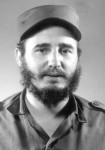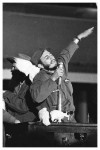 Fidel Castro (1926-2016) was a socialist revolutionary who in 1959 seized control of the island nation of Cuba. He ruled Cuba for almost half a century. Castro was the illegitimate son of a Spanish immigrant who had prospered in the sugar industry. As a teenager, he was both academically gifted and a talented sportsman with a tall and powerful physique. Castro began studying law at the University of Havana in 1945. It was there he became interested in politics, firstly student politics and then those of the national government. He graduated with a doctorate in 1950 and worked briefly for a small law firm in Cuba’s capital city, Havana. Castro held nationalist and anti-American political views. He wanted Cuba to be economically and politically independent from the US, which he viewed as a major exploiter of Latin American nations. Castro was especially outraged by the 1952 coup which brought Fulgencio Batista, a military officer, to the Cuban presidency. Batista’s regime was recognised by Washington days after the coup. To Castro, this was evidence that the coup was backed, if not orchestrated by the Americans.
Fidel Castro (1926-2016) was a socialist revolutionary who in 1959 seized control of the island nation of Cuba. He ruled Cuba for almost half a century. Castro was the illegitimate son of a Spanish immigrant who had prospered in the sugar industry. As a teenager, he was both academically gifted and a talented sportsman with a tall and powerful physique. Castro began studying law at the University of Havana in 1945. It was there he became interested in politics, firstly student politics and then those of the national government. He graduated with a doctorate in 1950 and worked briefly for a small law firm in Cuba’s capital city, Havana. Castro held nationalist and anti-American political views. He wanted Cuba to be economically and politically independent from the US, which he viewed as a major exploiter of Latin American nations. Castro was especially outraged by the 1952 coup which brought Fulgencio Batista, a military officer, to the Cuban presidency. Batista’s regime was recognised by Washington days after the coup. To Castro, this was evidence that the coup was backed, if not orchestrated by the Americans.
In July 1953 Castro led a group of 160 rebels armed with shotguns and rifles and attacked Cuba’s second-largest military barracks. The raid was a disaster, more rebels dying than soldiers. Castro and his brother Raul were captured and charged with treason. Castro used his trial to deliver a four-hour speech, where he condemned Batista as a dictator and outlined his own political platform for a new Cuba. It included a return to the socialist constitution of 1940, land reforms and redistribution, and profit sharing for both industrial workers (30 percent of the population) and sugar workers (55 percent). This monologue attracted publicity, though days later Castro was handed a 15-year prison sentence. In 1955 the government announced an amnesty for all political prisoners and Castro was released. He travelled to Mexico and completed military training with Spanish Civil War veterans and the Argentinian revolutionary Ernesto ‘Che’ Guevara. Castro also made contact with Soviet agents (an unsuccessful attempt to acquire supplies) then spent time in the US trying to drum up support for a counter-coup to remove Batista.

In December 1956, Castro, Guevara and about 80 other rebels returned to Cuba, determined to overthrow the Batista regime. On landing, they were met by a sizeable contingent of the Cuban military and utterly defeated, with three-quarters of the group either killed or taken prisoner. The survivors fled into Cuba’s remote mountain ranges, where they spent the next two years. By 1958 he commanded more than 1,000 armed men and enjoyed fast-growing civilian support. Castro and his lieutenants began sweeping through Cuba, province by province. They marched into Havana in January 1959, overthrowing the government and forcing Batista to flee. Nobody seemed to know what political road Castro might take. Earlier Castro had been a social democrat, a supporter of centre-left Cuban politicians. In the late 1940s, as Castro became more aware of Cuban poverty and the exploitation of labour, he gravitated towards the writings of Karl Marx and Vladimir Lenin. Later in life he declared himself a socialist. “Marxism taught me what society was”, Castro said later in his memoirs.
At first, Castro courted Washington, visiting the US in search of recognition and financial aid. When these were refused he gravitated towards the Soviet Union. In April 1961 Castro’s forces thwarted a poorly organised attempt at counter-revolution, conducted by Cuban exiles and bankrolled and supported by the Central Intelligence Agency (CIA). The Bay of Pigs invasion, as it became known, made Castro paranoid about American attempts to assassinate or overthrow him – and not without justification. In 1962 the Cuban leader permitted the deployment of Soviet troops and missiles in Cuba, a decision that triggered the famous crisis in October that year. Though American hostility towards Castro and his regime cooled after this, Cuba remained a pariah state. The island nation was subject to American trade, financial and diplomatic bans for the duration of the Cold War.
Castro himself remained in power until 2011, when ill health forced him to hand the reins to his brother Raul and retire from politics. Fidel Castro died in November 2016, just months after the US and Cuba had restored diplomatic relations.
Content on this page is © Alpha History 2018. This content may not be republished or distributed without permission. For more information please refer to our Terms of Use.
This page was written by Jennifer Llewellyn and Steve Thompson. To reference this page, use the following citation:
J. Llewellyn et al, “Fidel Castro”, Alpha History, accessed [today’s date], https://alphahistory.com/coldwar/fidel-castro/.
